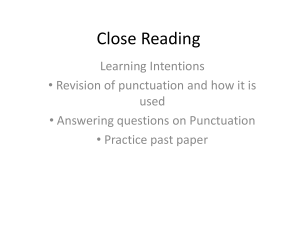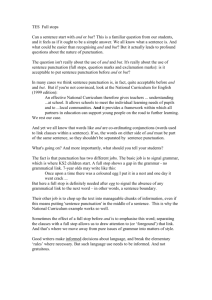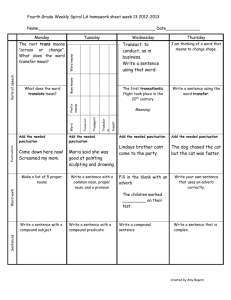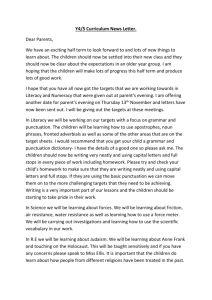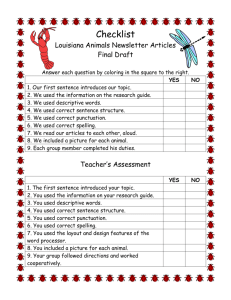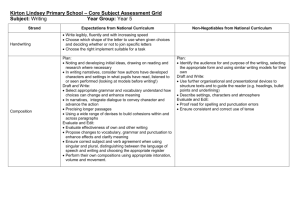PUNCTUATION for CONNECTING WORDS
advertisement
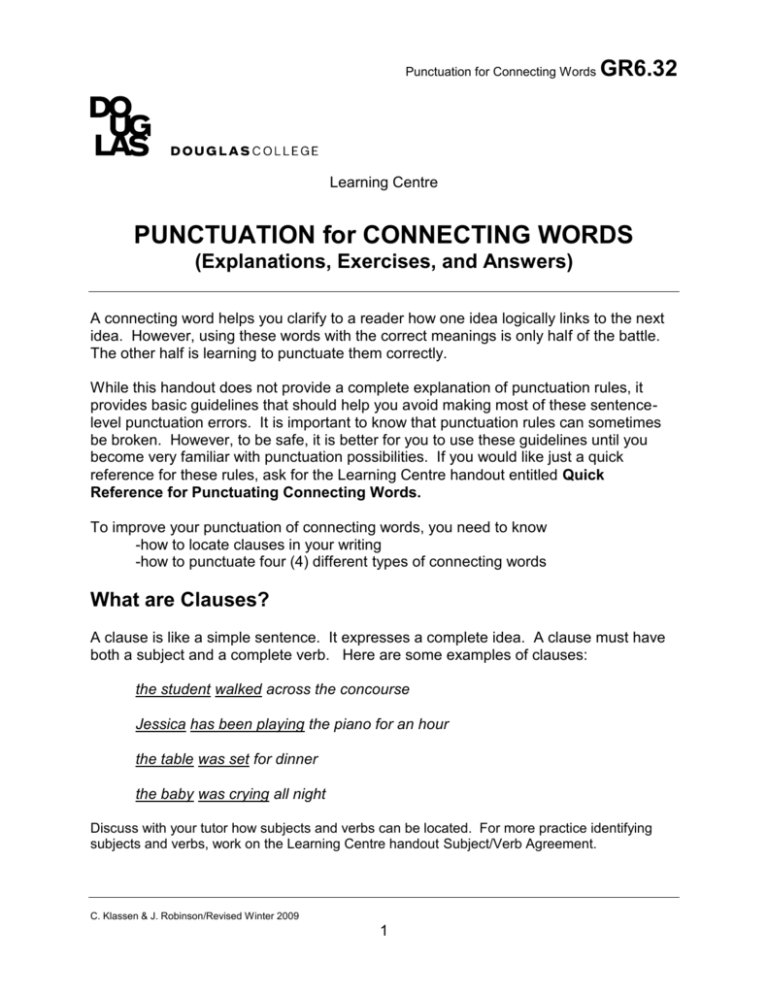
Punctuation for Connecting Words GR6.32 Learning Centre PUNCTUATION for CONNECTING WORDS (Explanations, Exercises, and Answers) A connecting word helps you clarify to a reader how one idea logically links to the next idea. However, using these words with the correct meanings is only half of the battle. The other half is learning to punctuate them correctly. While this handout does not provide a complete explanation of punctuation rules, it provides basic guidelines that should help you avoid making most of these sentencelevel punctuation errors. It is important to know that punctuation rules can sometimes be broken. However, to be safe, it is better for you to use these guidelines until you become very familiar with punctuation possibilities. If you would like just a quick reference for these rules, ask for the Learning Centre handout entitled Quick Reference for Punctuating Connecting Words. To improve your punctuation of connecting words, you need to know -how to locate clauses in your writing -how to punctuate four (4) different types of connecting words What are Clauses? A clause is like a simple sentence. It expresses a complete idea. A clause must have both a subject and a complete verb. Here are some examples of clauses: the student walked across the concourse Jessica has been playing the piano for an hour the table was set for dinner the baby was crying all night Discuss with your tutor how subjects and verbs can be located. For more practice identifying subjects and verbs, work on the Learning Centre handout Subject/Verb Agreement. C. Klassen & J. Robinson/Revised Winter 2009 1 Punctuation for Connecting Words GR6.32 Notice in the next set of examples that you can add connecting words to these ideas, and they are still clauses because they have subjects and complete verbs; however, they cannot stand on their own any longer as completed thoughts because they need another clause to complete the thought. when the student walked across the concourse if Jessica has been playing the piano for an hour because the table was set for dinner even though the baby was crying all night The following examples are not clauses. Can you see why not? Discuss with your tutor how the following phrases are different from the clauses in the two sets of examples on the previous page. walking across the concourse Jessica at the piano for an hour a set table the baby crying all night Below you will find explanations, examples and exercises for four (4) different types of connecting words 1) Co-ordinating Conjunctions The most common co-ordinating conjunctions are “and, or, nor, but, yet, so.” Clause Chris decided to transfer to UBC Co-ordinator , and Clause John decided to apply at SFU. You will notice in the examples on the next page that you do not always need to include a comma before some co-ordinating conjunctions. With the connectors “and” and “or”, if clauses are short and closely related (such as cause and effect), then commas are not generally used. The best way to decide if a comma is needed with “and” and “or” is to decide if there is a clear pause when you read the sentence out loud. However, the other connectors “but, yet, and so” should almost always have commas before them if they separate two clauses. * * It is important to know that “and” and “or” are also frequently used to join words and phrases in lists that are not complete clauses. The punctuation rules for making lists are different than for joining clauses. If you would like to learn rules for punctuating lists, ask a tutor for the Commas handout. C. Klassen & J. Robinson/Revised Winter 2009 2 Punctuation for Connecting Words GR6.32 Co-ordinators Examples and She loved that movie. It was exciting, and her favorite actor had the lead role. Sometimes the demand goes up and the price does not fall. or You could take the children to the park, or you could take them to a movie. We need to go now or we will be late for class. but James decided go to a movie, but Kim stayed home to study. so He made a lot of mistakes, so he had to do the assignment again. yet Carl usually gets at least eight hours of sleep most nights, yet he’s always tired. Exercise 1: Combine the following groups of sentences into longer sentences by using “and, or, but, so, yet;” Use correct punctuation. 1) Carlos lives in Canada He was born in Peru 2) The car ran out of gas Bob had to walk two kilometers to find a gas station 3) Maria could go to art school in New York She could stay in Vancouver to look for a job 4) Penelope likes to drive fast She got too many speeding tickets She lost her driver’s license C. Klassen & J. Robinson/Revised Winter 2009 3 Punctuation for Connecting Words GR6.32 Add correct punctuation (periods and commas) to the following paragraph: Exercise 2: Mark loves to travel but Amy doesn’t so they often argue about where to spend their vacation time one summer they decided to try something different Mark went to Thailand but Amy stayed home Mark’s brother, Alex, and sister-in-law, Jennifer, went with him they knew that they could only spend one week in Thailand so they had to decide what to do they could all go scuba diving in Southern Thailand or Mark could go by himself on an elephant trek in Northern Thailand and Alex and Jennifer could meet him later in Bangkok Mark chose the elephant trek and he had an exciting time Amy was also having a good time back home sometimes she went out with her friends at night and sometimes her mother would visit her during the day she also liked to spend time by herself practicing her piano Mark and Amy learned that they could spent their vacations separately yet they both could have a good time 2) Transitions Notice in the examples below that the transition word “therefore” can have either a semi-colon or a period before it, but that it also has a comma after it. Transition words almost always have punctuation both before and after them. Clause Transition Clause Governments need money to operate ; therefore, they require us to pay taxes. Governments need money to operate . Therefore, they require us to pay taxes. Because so many transition words and phrases exist, only frequently used transition words and phrases are listed on the next page: C. Klassen & J. Robinson/Revised Winter 2009 4 Punctuation for Connecting Words Transitions Examples for example for instance to illustrate Dogs are very useful animals; for instance, they can help the police find suspects. also in addition besides Students can learn to study more effectively by following realistic study schedules. Also, they can improve their textbook reading and note taking skills. that is in other words in fact actually Universities require transcripts; that is, they want records of your grades from previous schools you went to. Caffeine does not always wake you up; in fact, it can slow your responses down. similarly in the same way My brother has a great sense of humour; in the same way, my father loves a good joke. in contrast however on the other hand instead otherwise Vancouver winters are usually rainy and dark; in contrast, Edmonton winters tend to be cold and bright. nevertheless even so admittedly Mike knows he needs more sleep; nevertheless, he stays up late every night playing computer games. as a result therefore consequently thus The drunk driver crashed into a police car; as a result, he spent the night in jail and lost his driver’s license. previously next later after that first, second, since then finally First, he phoned his lawyer; later, he reported the accident to police. C. Klassen & J. Robinson/Revised Winter 2009 5 GR6.32 Punctuation for Connecting Words GR6.32 Exercise 3: Use transitions from the list above to combine the following groups of ideas. Use correct punctuation. 1) Marjorie is turning fifty this weekend. She says that she feels like a twenty-one year old. 2) Jimmy and Kevin spend most of their time playing hockey. They are excellent players. 3) You could take a bus. My father could drive you. 4) The garden tools should not be left outside. They will rust. Some, but not all, transitions can be moved to other places in a sentence; however, the punctuation rules change when you move the transition. Compare the following examples: Vancouver winters are usually rainy and dark; however, Edmonton winters tend to be cold and bright. Vancouver winters are usually rainy and dark; Edmonton winters, however, tend to be cold and bright. The rule is simple. If you place the transition somewhere in the middle of a clause rather than at the beginning of the clause, you still need to include punctuation on both sides of it (a comma in front of it and after it). C. Klassen & J. Robinson/Revised Winter 2009 6 Punctuation for Connecting Words GR6.32 Exercise 4: Rewrite the following sentences by moving each transition several words later in the second clause to a place where the transition still sounds good. Make sure you change the punctuation as well. Check your changes with a tutor to make sure your revision works. 1) The economy is strong. Therefore, interest rates tend to be high. 2) Everybody at the party saw the stranger. However, no one asked who he was. 3) You could finish your degree next year. On the other hand, you could choose to work instead. 4) Agriculture contributes to greenhouse gases. For example, farm animals and rice fields add a great deal of methane gas to the atmosphere. 3) Subordinators (Adverb Clauses) There are two important differences between subordinators (below) and most other connecting words (above): 1) when you put a subordinator between two clauses to connect them, you should not use any punctuation. 2) when you put the subordinator at the beginning of a clause to introduce the main clause, you need to put a comma between the two clauses. Clause Subordinator He did his homework before Before he turned on the TV, he did his homework. C. Klassen & J. Robinson/Revised Winter 2009 7 Clause he turned on the TV. Punctuation for Connecting Words GR6.32 Because there are many subordinators in English, only frequently used subordinating words are listed below: Subordinator Examples while whereas While Douglas offers only the first two years of university courses, Kwantlen offers complete four year programs. as just as Just as organisms compete for resources in an ecosystem, businesses compete for consumers in a market. before after when whenever while until since as as soon as She was listening to the radio when the phone rang. because since as She’s taking psychology courses because she’s curious about human behaviour. though although even though Even though Cathy works hard in that course, she still isn’t getting good grades. so+adjective+that such+noun+that She was so tired that she went to bed at 8 o’clock. He was such a good doctor that she told her friends about him. if only if even if as long as unless when whenever If you need help with one of your courses, you can make an appointment with a tutor in the Learning Centre. Whenever the fire alarm sounds, students must leave their classes to stand outside of the building. We’ll have a picnic at Queens Park unless it rains. C. Klassen & J. Robinson/Revised Winter 2009 8 Punctuation for Connecting Words GR6.32 Exercise 5: Join the following ideas using the suggested subordinators. Write each sentence in two ways, first using the subordinators between the two ideas and then rewriting each sentence by placing the subordinator at the beginning of the two clauses. 1) because BC has a strong service industry it is a favourite destination for tourists a) b) 2) even though my car is old and rusty it takes me where I want to go a) b) 4) Prepositional Phrases that join ideas Many times, a writer does not need a complete clause (subject + verb) to connect one idea to another. Sometimes, small words called prepositions make it possible to simplify the statement. Compare the following two sentences. Look at how the preposition of works in the second sentence. Because the test was scheduled for the next day, James stayed home to study. Because of the test the next day, James stayed home to study. Whenever a preposition is used to help join two parts of a sentence, the preposition is never followed by a verb. Look at the following connecting prepositions to see more examples of how verbs cannot be used after prepositions. Prepositional Connectors Examples due to because of We didn’t go camping because of the rain. in spite of despite In spite of the rain, we went camping. C. Klassen & J. Robinson/Revised Winter 2009 9 Punctuation for Connecting Words GR6.32 In the following examples, you can see that prepositional phrase connectors use the same punctuation rules as subordinators. a) Do not use any punctuation when a prepositional phrase connector is in the middle of sentence. Margaret couldn’t call her husband on her cell phone because of a dead battery. b) Use a comma after the end of the prepositional phrase if the sentence begins with the phrase: Because of a dead battery, Margaret couldn’t call her husband on her cell phone. Exercise 6: Join the following ideas using the suggested preposition phrases. Write each sentence in two ways, first using the connectors between the two ideas and then rewriting each sentence by placing the connectors at the beginning. 1) because of many people have jobs BC’s strong service industry a) b) 2) In spite of my car takes me where I want to go its age and rust a) b) C. Klassen & J. Robinson/Revised Winter 2009 10 Punctuation for Connecting Words GR6.32 Practice what you have learned about punctuating connecting words by adding correct punctuation to the following paragraph: Exercise 7: Although new technology creates new kinds of jobs new technology also usually makes many existing jobs disappear for example when trains started to be used as a primary form of transportation many jobs that depended on horses and oxen started to disappear later automobiles became the major form of transportation as a result railroad companies could no longer keep as many people employed another new kind of technology that is leading to job loss is the digital camera companies that make film are laying off workers because so many consumers are switching from cameras that use film to cameras that take digital photographs in the same way cell phones make public pay phones less profitable so telephone companies no longer need to employ as many technicians to install and maintain pay phones while it is true that technological change can produce new wealth and new jobs new inventions also tend to lead to the loss of jobs For more practice with punctuating connecting words, see: Azar, B. (1999). Understanding and Using English grammar (3d Edition). Toronto: Prentice Hall Regents. Chapters 16, 17, 19. Benson, B. and Byrd, P. (1989). Improving the grammar of written English: The editing process. Boston: Heinle and Heinle. pp. 49-74. C. Klassen & J. Robinson/Revised Winter 2009 11 Punctuation for Connecting Words GR6.32 Douglas College Learning Centre PUNCTUATION FOR CONNECTING WORDS – ANSWER KEY 1) Co-ordinating Conjuctions Exercise 1: 1) 2) 3) 4) Carlos lives in Canada, but he was born in Peru. The car ran out of gas, so Bob had to walk two kilometers to find a gas station. Maria could go to art school in New York, or she could stay in Vancouver to look for a job. Penelope likes to drive fast, but she got too many speeding tickets, so she lost her driver’s license. Exercise 2: Mark loves to travel, but Amy doesn’t, so they often argue about where to spend their vacation time. One summer, they decided to try something different. Mark went to Thailand, but Amy stayed home. Mark’s brother, Alex, and sister-in-law, Jennifer, went with him. They knew that they could only spend one week in Thailand, so they had to decide what to do. They could all go scuba diving in Southern Thailand, or Mark could go by himself on an elephant trek in Northern Thailand, and Alex and Jennifer could meet him later in Bangkok. Mark chose the elephant trek, and he had an exciting time. Amy was also having a good time back home. Sometimes she went out with her friends at night, and sometimes her mother would visit her during the day. She also liked to spend time by herself practicing her piano. Mark and Amy learned that they could spent their vacations separately, yet they both could have a good time C. Klassen & J. Robinson/Revised Winter 2009 12 Punctuation for Connecting Words GR6.32 2) Transitions Exercise 3: 1) 2) 3) 4) Marjorie is turning fifty this weekend. However, she says that she feels like a twenty-one year old. Jimmy and Kevin spend most of their time playing hockey. As a result, they are excellent players. You could take a bus. On the other hand, my father could drive you. The garden tools should not be left outside. Otherwise, they will rust Exercise 4: 1) 2) 3) 4) The economy is strong. Interest rates, therefore, tend to be high. Everybody at the party saw the stranger. No one, however, asked who he was. You could finish your degree next year. You could, on the other hand, choose to work instead. Agriculture contributes to greenhouse gases. Farm animals and rice fields, for example, add a great deal of methane gas to the atmosphere. 4) Subordinators Exercise 5: 1) because a) Because BC has a strong service industry, it is a favorite destination for tourists. b) BC is a favourite destination for tourists because it has a strong service industry. 2) Even though a) Even though my car is old and rusty, it takes me where I want to go. b) My car takes me where I want to go even though it is old and rusty. C. Klassen & J. Robinson/Revised Winter 2009 13 Punctuation for Connecting Words GR6.32 4) Prepositional Phrases Exercise 6: 1) because of a) Many people have jobs because of BC’s strong service industry. b) Because of BC’s strong service industry, many people have jobs. 2) In spite of a) My car takes me where I want to go in spite of its age and rust. b) In spite of its age and rust, my car takes me where I want to go. Exercise 7: Although new technology creates new kinds of jobs, new technology also usually makes many existing jobs disappear. For example, when trains started to be used as a primary form of transportation, many jobs that depended on horses and oxen started to disappear. Later, automobiles became the major form of transportation; as a result, railroad companies could no longer keep as many people employed. Another new kind of technology that is leading to job loss is the digital camera. Companies that make film are laying off workers because so many consumers are switching from cameras that use film to cameras that take digital photographs. In the same way, cell phones make public pay phones less profitable, so telephone companies no longer need to employ as many technicians to install and maintain pay phones. While it is true that technological change can produce new wealth and new jobs, new inventions also tend to lead to the loss of jobs. C. Klassen & J. Robinson/Revised Winter 2009 14 Punctuation for Connecting Words GR6.32 Exercise 7: Although new technology creates new kinds of jobs, new technology also usually makes many existing jobs disappear. For example, when trains started to be used as a primary form of transportation, many jobs that depended on horses and oxen started to disappear. Later, automobiles became the major form of transportation. As a result, railroad companies could no longer keep as many people employed. Another new kind of technology that is leading to job loss is the digital camera. Companies that make film are laying off workers because so many consumers are switching from cameras that use film to cameras that take digital photographs. In the same way, cell phones make public pay phones less profitable, so telephone companies no longer need to employ as many technicians to install and maintain pay phones. While it is true that technological change can produce new wealth and new jobs, new inventions also tend to lead to the loss of jobs. C. Klassen & J. Robinson/Revised Winter 2009 15
